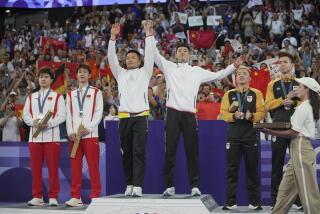Taiwan Risking War, Chinese Official Says
- Share via
BEIJING — The Chinese government fired a verbal salvo across the Taiwan Strait on Wednesday, arguing in published remarks that Beijing might be forced to react militarily if Taiwanese leaders pursued independence.
The threat comes as campaigning heats up for Taiwan’s March election. President Chen Shui-bian’s reelection bid has gained traction in recent weeks with plans for a new constitution and a law that would allow Taiwanese to call for referendums, which could lead to a direct vote on independence. This has angered Beijing, which considers Taiwan part of China.
“Independence Stance May Trigger War,” declared a headline on the front page of the government-run China Daily, over an article quoting Wang Zaixi, deputy director of China’s Taiwan Affairs Office.
“War will break out if the island declares formal independence,” Wang reportedly told a seminar on cross-strait relations. “If the Taiwan authorities collude with all splittist forces to openly engage in pro-independence activities and challenge the mainland and the one-China principle, the use of force may become unavoidable.”
Huang Chieh-cheng, vice chairman of the Mainland Affairs Council office in Taipei, said Taiwan was a democratic society preparing for an election.
“We urge Beijing to abandon its move to a hostile direction and come back to peace and stability,” Huang said. “We don’t want to see Beijing misinterpret this democratic process.”
Back on the mainland, China’s Taiwan Affairs office declined to comment.
China’s threatened use of force follows a period of relative quiet on the issue.
Jia Qingguo, associate dean of international relations at Beijing University, attributed the timing of the Wednesday remarks to growing frustration in Beijing that finally boiled over.
“It’s built up,” he said. “The Chinese government has been pretty low-key in the recent past, but Chen Shui-bian has taken advantage of this.”
Beijing’s list of perceived slights includes Chen’s recent trip to Panama, where he shook hands with Secretary of State Colin L. Powell, the Taiwanese leader’s bid to revise the constitution and the ongoing sale of U.S. weapons to the island.
Some third-party analysts, however, said China still had not learned that such outbursts were counterproductive.
“If I was advising China, I would say they should keep quiet,” said J. Bruce Jacobs, a professor of Asian languages and studies at Australia’s Monash University.
China’s 1996 test launch of missiles across the strait focused global media spotlight on Taiwan’s first direct presidential election and boosted incumbent Lee Teng-hui’s showing to more than 50% from 33% projected in polls, Jacobs said.
Harsh comments by Chinese Premier Zhu Rongji in 2000 similarly worked against China’s interests, Jacobs added. Zhu had warned voters to steer clear of Chen, a move that some said assured Chen’s victory.
China has become far more flexible and nuanced in most areas of its foreign policy, said associate dean Jia. But Taiwan is one issue that is not negotiable.
“Even if Chen Shui-bian gets more votes, the government will still make these comments to show its stance,” he said. “The one-China policy is the most important thing, not the election.”
On the streets of Beijing, meanwhile, residents reacted with a sense of deja vu.
“It’s quite common for our government to make such statements,” said Zhang Yifan, 21. “This has nothing to do with ordinary people.”
A 40-year-old man, who declined to give his name, said that he had also heard it all before but felt that the government should be even tougher.
“Compared to the days of Mao Tse-tung and Deng Xiaoping, our government is too soft these days,” he said. “How is it that Chinese people can fly into space, but they still can’t deal with Taiwan?”
*
Yin Lijin in The Times’ Beijing Bureau contributed to this report.
More to Read
Sign up for Essential California
The most important California stories and recommendations in your inbox every morning.
You may occasionally receive promotional content from the Los Angeles Times.













